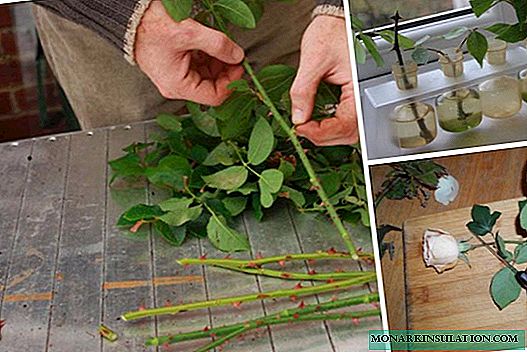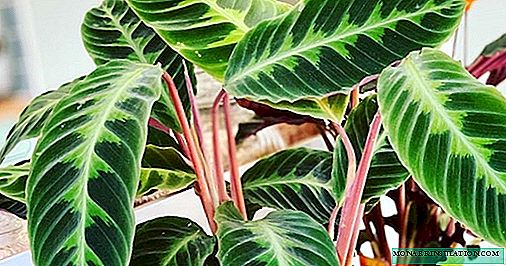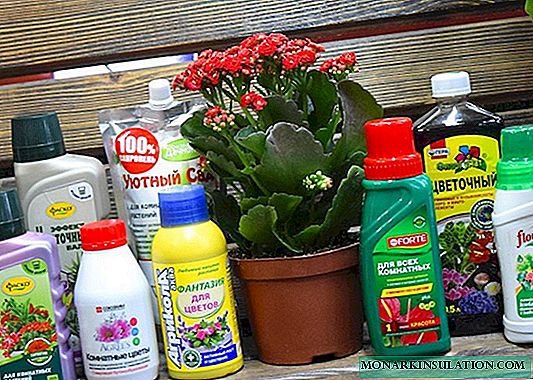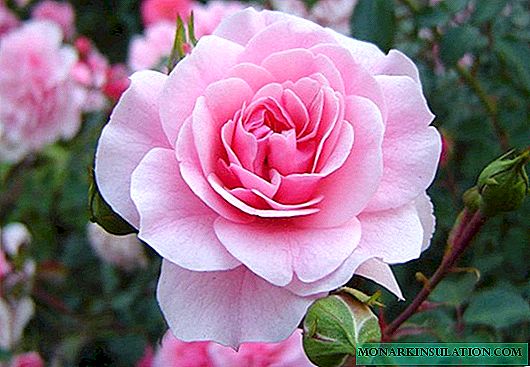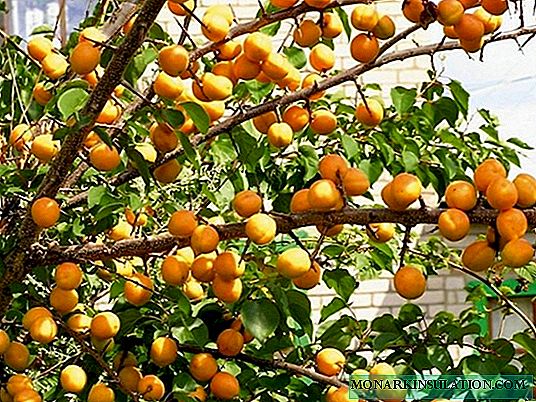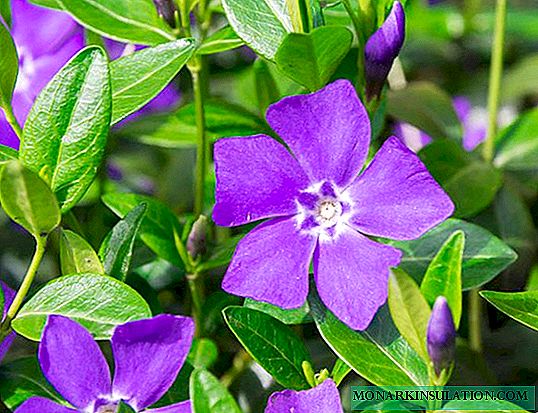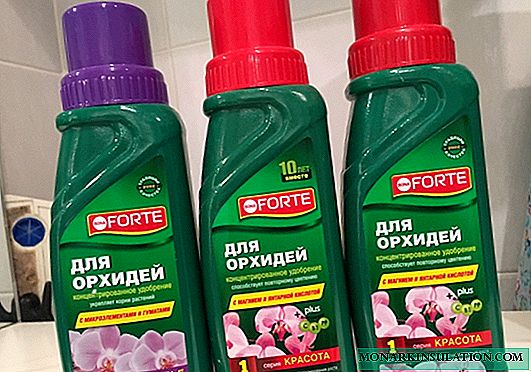Variegated rose floribunda surprises with its color and color combination. Rose bush Sim Salabim conquers the hearts of gardeners lovers. In cultivation, the pink hybrid is unpretentious, resistant to fungal diseases.
Rosa Sim Salabim (Simsalabim) - what kind of variety, the history of creation
A hybrid of repair and tea roses was obtained in Germany. The first description of the Simsalabim rose was given by the Kordes hybridizer.
Short description, characteristic
The shrub grows to 1 m in height, compact, not sprawling. The foliage is dark green, the edges of the leaves have small notches. Flowering lasts from June to November. The flower has a goblet shape up to 10 cm in diameter. Petals open in a spiral, in one flower there are about 25 pieces. Color yellow with burgundy stains, stripes, splashes. The aroma is light.
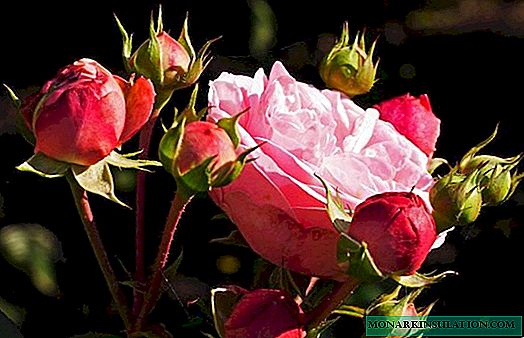
The amazing color of floribunda roses
Interesting to know! Spotted and purely yellow buds can bloom on one pink bush. Each flower has a unique color.
Advantages and disadvantages of the variety
The advantages of the variety are beautiful flowering and a combination of flowers on the petals. The rose blooms for a long time, is resistant to frost and fungal diseases.
The disadvantage of the variety is a possible reversal. When the flower returns to the state of an ordinary rose or completely degenerates into a wild rose. Hybrids are grown no more than five years.
Use in landscape design
Bright Sim Salabim is always in the spotlight, even if used in group plantings. It's hard to get past such beauty. The height of the bush allows her to decorate the background of mixborders. Looks great in rosaries and as solitary plantings.

Blooming Rose Sim Salabim
Growing a flower, how to plant in open ground
Planting and the first 30 days of care play a decisive role in the future existence of the rose bush. This point should be given maximum attention.
In what form is landing
Hybrid varieties are most often sold in the form of grafted seedlings. Planting material must be healthy in appearance, without mechanical and painful damage. It is better to buy seedlings divorced in the same region where they will be planted.
What time is the landing
You can plant young bushes from March to October. The optimal period for planting is considered spring.
Location selection
Rose remarkably tolerates partial shade for several hours throughout the day. The hybrid is afraid of through cold winds and groundwater. This should be considered first of all when choosing a place of growth.
How to prepare the soil and flower for planting
The soil must be loose and nutritious. A good combination would be a mixture of:
- humus;
- clay;
- river sand;
- peat.
For nutrition, bone meal and superphosphate should be added. You can increase the survival rate of a young bush by treating its roots with a clay chatter 30 minutes before planting.
Landing procedure step by step
When the soil and seedling are ready, you can begin to plant it:
- The planting hole is dug out under the size of the root system of the seedling. Depth should be twice as long as the roots.
- The bottom of the pit is covered with 10 cm of drainage.
- A layer of compost is laid on top of the drainage layer.
- The prepared mixture of earth is poured by a hill.
- A seedling is set so that the vaccination site is deepened by 5-7 cm.
- It is covered with soil mixture from above.

Deepening a seedling for proper growth
Further, the rose is abundantly watered and mulched with sawdust or peat. After planting for 2 years, the young bush eats completely from the landing pit. Additional top dressing is not necessary.
Plant care
Hybrid roses are even easier to care for than ordinary roses. Hybrids are much more resistant to disease and damage.
Watering rules and humidity
Since mid-spring, the rose needs regular watering. Once a week will be enough. In hot periods of summer, watering is needed up to 3 times a week. A young bush is saturated with 10 liters of water for one irrigation. But an adult needs at least 30 liters. In autumn, bushes are poured abundantly in order to prepare a thermal pillow for winter. After the first frost, watering stops completely.
To keep moisture under a rose bush, it is mulched. Peat, spruce needles, peat, humus are suitable as mulch.
Top dressing and soil quality
Every spring, a rosette is fed with nitrogen-containing fertilizer. So it will grow the green part. From the beginning of flowering, roses need the support of potassium and phosphorus. These components support the flowering and brightness of the buds.
Pruning and transplanting
Each grower decides for himself when it is more convenient for him to trim the bushes thoroughly - in autumn or spring. In any case, one of the scraps should be preventive. When damaged shoots or branches clogging a plant are removed. The main pruning is to cut all branches to 3-4 buds. The length of the branch after pruning should be more than 10 cm. During the flowering season, wilted buds must be cut together with the top.

The scheme of the correct pruning of roses
The climbing rose Sim Salabim is trimmed so that for the next season there are 3-5 annual and two year old shoots.
Features of wintering a flower
Grade Sim Salabim is frost-resistant, but weather conditions can lead to many diseases. With the onset of stable frosts below +7 ℃, the flower needs to be prepared for wintering:
- to ground;
- cover with spruce branches;
- fill the bush with snow.

Insulation and protection of the bush
Such an organization of wintering for the plant will keep its branches intact until spring.
Flowering roses
Charming rose bloom - a combination of two contrasting colors. Sim Salabim blooms profusely from early June to autumn.
Period of activity and rest
The active growth period begins in the spring, when sap flow begins in the branches of the rose. Already in June, the rose throws the first buds. After the cessation of flowering, in mid-autumn, the growth of the flower stops, and it goes into a dormant period.
Care during and after flowering
During flowering, it is important to saturate the bush with moisture and nutrition. Regular pruning of sluggish flowers provokes the release of new buds. After flowering, you need to properly prepare the bush for winter.
What to do if it does not bloom, possible causes
If the rose Simsalabim does not produce buds, you need to pay attention to the following reasons:
- proper pruning of the bush;
- lack of sufficient nutrition for flowering;
- irregular watering;
- the effects of disease or pest damage.
When proper care is restored, the rose will bloom.
Flower propagation
It is easiest to propagate Sim Salabim by cuttings. There are also more complex and time-consuming methods - propagation by vaccination or seeds.
When produced
You can cut the rose from the beginning of June to the end of July. Grafting of cuttings is also carried out during this period. Plant seeds should be after collecting them.
Detailed description
Two cuts must be present on the handle. The lower one is oblique, the upper one is straight. There should be three buds on the handle. Propagation of the rose by cuttings step by step:
- The lower leaves are removed completely, the upper half.
- The stalk is planted at an angle.
- The nursery is covered with film or glass.
For cuttings need regular watering, cultivation and complementary foods. For winter, the nursery is well insulated.
Diseases, pests and ways to combat them
Every spring, the rose must be treated with diseases and parasites with special substances. Such prevention will ensure a quiet life for the grower and rose bush.
Floribunda roses are beautiful flowers. The variety Sim Salabim is mesmerizing with beauty. The incredible structure of the buds requires attention and care. Caring for a rose is a snap.


